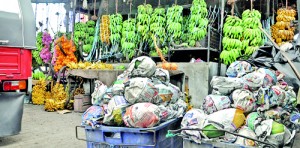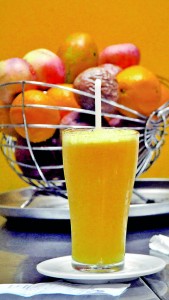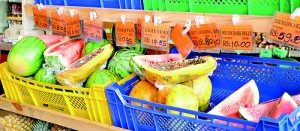News
Experts bemoan no law against chemical enhancement of fruits and vegetables
An agriculture specialist expressed disappointment over the authorities’ failure to take action against unethical practices such as spraying agro-chemicals on vegetables.

Fruits squashed and transported in plastic containers in front of a wayside fruit stall. Pix by Indika Handuwala
Head of the Food Research Unit in Gannoruwa, Peradeniya, Dr K.H. Sarananda said there was no law to take legal action against those using methods of pesticide spraying and chemical ripening that are harmful to humans.
“The Agriculture Department is like a vegetable with no powers, and is the body to provide technical assistance. The Department should be strengthened in order to prevent these malpractices. Some farmers increase doses as they wish. There is no monitoring on a field basis,” he said.
According to the Head Researcher, preparing fresh salads using vegetables is very risky, as chemical substances may be present in the vegetables, and almost all vegetables need to be well cooked.
“It is recommended to spray agro-chemicals two weeks prior to harvesting, and maintain a 14-day chemical free environment. But, at present, farmers spray vegetables the day before harvesting, and in some instances, when the vegetables are loaded into the lorries. Unfortunately, there is no law to fine or charge persons involved in bad practices of chemical spraying,” he said.

The fruit juice looks tempting but how fresh are the fruits that went into it?
Researchers from the Hector Kobbekaduwa Agrarian Research and Training Institute (HARTI) recently found out that about 25 per cent of farmers maintain a separate plot for chemical-free vegetables for their own consumption.
Dr Sarananda also said there was a trend of fruit ripening by spraying liquid ethylene on raw fruits.
The Sunday Times learns that, though prohibited, in some areas like Embilipitiya where fruits are grown for commercial purposes, the use of banned calcium carbide and urea on fruits still takes place.
Fruits grown for commercial purposes are allowed to be sprayed with small quantities of ethylene gas to enhance their natural ripening. But plucking fruits while they are raw and spraying high doses of ripening-chemicals is not recommended. There are mangoes sold in the market, all ripe and plump outside, but raw inside. Even farmers and distributors practice this, there is no way to punish them,” he said.
Last week, the Consumer Affairs Authority (CAA) seized 75,000 kg of ethephon-sprayed (a fruit growth enhancer) mangoes and bananas to be sold to unsuspecting consumers.
“Destroying fruits is not the solution. There should be a mechanism to ensure safe fruits arrive at the

Halved fruits available in a super market
market. There is a need to test the vegetables and fruits sold in shops and supermarkets, and prevent them entering the market,” he said.
Consumer Affairs Authority (CAA) Director General, Douglas said that the CAA would team up with local health authorities to commence inspection of fruits and vegetables sold in local polas as well as supermarkets.

